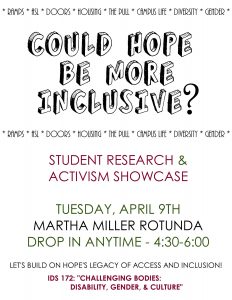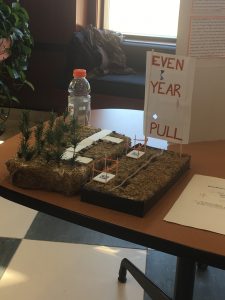Claiming My Education: Could Hope Be More Inclusive? An Event Review
by Kelly Gotham
“Student Feature” is our newest addition to the WGS blog. Student-scholars enrolled in WGS courses have consented to share their experiences inside and outside the classroom with the Hope community. Today, one student reviews the April 9, 2019 event, “Could Hope Be More Inclusive?”
 On April 9, 2019, I attended the event, “Could Hope Be More Inclusive?,” a student research and activism showcase run by the “Challenging Bodies: Disability, Gender, and Culture” Cultural Heritage class, taught by Dr. Christiana Salah.
On April 9, 2019, I attended the event, “Could Hope Be More Inclusive?,” a student research and activism showcase run by the “Challenging Bodies: Disability, Gender, and Culture” Cultural Heritage class, taught by Dr. Christiana Salah.
There were several groups presenting about a number of topics, and I walked around to each group’s station to learn more. I could say a lot about each topic, but I will keep it brief.
- Group one researched American Sign Language (ASL). This group emphasized people’s interest in learning ASL, jobs that incorporate ASL, and the unfortunate reasons why ASL is not taught at Hope.
- After researching Gender Inclusive Housing, the second group shared Hope is not as gender inclusive as it could be, mostly because of its affiliation with the Reformed Church in America (RCA) which does not accept the LGBTQ community. The group suggested that for gender inclusivity, Hope would likely have to separate from the RCA.
- The third group discussed the inaccessibility of Dykstra Hall, a campus dormitory, noting that Dykstra is not wheelchair accessible. They proposed building a ramp next to the external stairs and changing clusters 1-6 to be fully accessible.
- The next group discussed the need for a Women’s Center on campus. Their research included justifications for a safe space for sexual assault survivors.
- The following group presented solutions for making the location of The Pull more accessible. The best part? They created a model. The model shows a clear pathway and accessible sitting areas for assistive mobility devices.
- The last group created a mock patient portal for the Counseling and Psychological Services (CAPS) website where anyone can submit an anonymous entry to get help with mental illness treatment.

Pictured is the group’s model; this model offers accessibility features for The Pull location.
I thought the event was very well presented and I learned more about how Hope is trying to be a more inclusive campus. A few things there had already been discussed in my WGS 200 class like how Dykstra is not accessible and the need for Gender Inclusive Housing. Something I had never thought of before this event, however, was making the Pull accessible and having an online portal for CAPS.
I have a friend who lived in Dykstra and had to be moved to Cook Hall because she injured her back severely and is unable to use stairs. It is so sad that she was not able to continue living where she has been comfortable all year and be with her friends because of Dykstra’s inaccessibility. It seems like Hope pushes important issues aside because it costs too much to resolve, and that is somewhat concerning. Taking this class and going to this event really broadened my perspective on these topics and now I can share the information I learned with others. Overall, I think the event was very informative and something people should be talking about more. All of the issues presented are important, and I hope they can be adopted.
Are you a WGS major or minor? Or are you enrolled in a WGS course? Would you like to contribute to “Student Feature”? Email wgs AT hope DOT edu.

